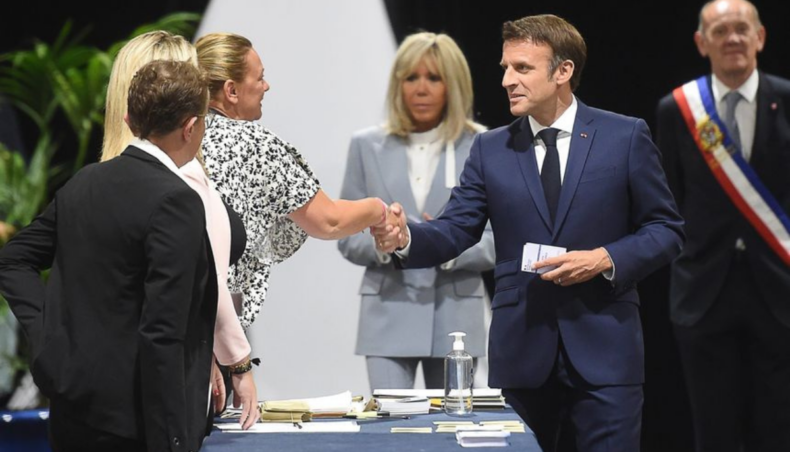As he looked for a way to escape political stagnation following this weekend’s election setback in parliament, French opposition leaders warned President Emmanuel Macron on Tuesday that they would not make life easy for him.
Some critics suggested that Macron replace his prime minister, re-evaluate his reform initiatives, and abandon his top-down management style.
While he had complete authority over the legislature for the previous five years, Macron is now in need of opposition after voters upset about inflation and his perceived indifference resulted in a hung parliament on Sunday.
The election outcome might usher in a period of political volatility in France that hasn’t been witnessed in years.
Senior ministers declared that the government would keep working and seek assistance from the legislature whenever it required a majority.
The former prime minister of France and prominent personality Edouard Philippe exhorted parties to create a coalition in order to secure a majority for the government. In French politics today, this would be a first.
‘The French Coalition’
For the first time in French history, Philippe said on BFM TV, “We need to establish a coalition, a big coalition of people who spontaneously don’t want to work together and who put forward divergent political programs.”
He stated that he could “see” working out a compromise with Philippe’s former political family, the conservative party Les Republicains, from which he broke away when Macron was elected for the first time in 2017.
Christian Jacob, the leader of Les Republicains, stated this about entering a coalition agreement after meeting Macron: “I informed the president that it was out of the question, that would be a betrayal of our voters.”
Jacob had previously referred to the president as “arrogant”.
But his camp began to show signs of cracking. Les Republicans member Catherine Vautrin, who had been mentioned as a potential candidate to become Macron’s future prime minister, pushed her party to adopt a more accommodating posture.
“Do all Republican legislators agree with Christian Jacob’s perspective? I’m not so certain “She spoke. “Being in opposition is useless all the time”.
She claimed that her party and Macron may find common ground on anticipated reforms, particularly those involving retirement legislation.
The most obvious location for Macron to gain support is with Les Republicains. They overwhelmingly agree with Macron’s economic policies, notably his desire to raise the retirement age by three years to 65.
Jacob seemed to be inviting potentially troublesome bill-by-bill negotiations when he declared his party would be “responsible.”
‘Compromise’
Marine Le Pen said Macron must listen to her party’s concerns because he “cannot continue the program he has led (so far)” and that her far-right National Rally now has 89 MPs, up from eight in the last legislature.
National Rally (Rassemblement National), a far-right party in France, achieved remarkable success by capturing 89 seats, a rise of 89 times over the 8 seats it held during Macron’s first term.
Parti Socialiste leader Olivier Faure said his party could support some policy initiatives, but only if Macron adopted their ideas. The Parti Socialiste joined the left-wing coalition Nupes before the election.
Votes were divided across parties in the 2017 elections since the left did not run as a single entity. But in 2022, Macron faced a unified opposition from the NUPES coalition, which was led by Jean-Luc Mélenchon, who finished third in the presidential race where 131 seats went to the alliance.
It is uncertain whether NUPES will be able to maintain an alliance in the National Assembly or whether the parties will pursue their individual agendas now that they have been elected. A number of people have already rejected the idea of Mélenchon creating a solitary parliamentary group.
The president made decisions alone and was not held accountable to anyone during this so-called Jupiterian period, Faure told reporters.
Macron is considering building a national unity government, and he asked Fabien Roussel, secretary-general of the Communist Party if he would take part.












